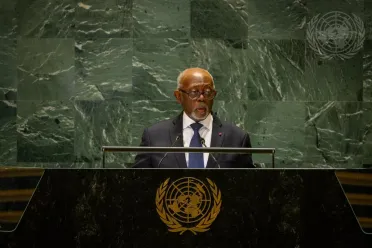Statement
Statement summary
LEJEUNE MBELLA MBELLA, Minister for External Relations of Cameroon, emphasized that climate-displaced people are now as numerous as refugees and internally displaced victims of war. Cameroon is sparing no effort to find relevant solutions to the crisis, calling for the Paris Agreement to be implemented without delay. Unfortunately, he noted, the financial and technical means and resources are still “mobilized in a parsimonious way”. Citing conflicts and sources of tension, old or new, that spare no geographical are — including Sudan, Gaza, Lebanon and Ukraine — he noted such situations fuel the arms race, including in space, in the seas and oceans, as well as increasing use of light weapons and weapons of mass destruction. They also drive geopolitical tensions, rivalries and mistrust between States, threatening that the world may live through another dark chapter in human history, as was the case at the beginning of the twentieth century — a trend that must be reversed as soon as possible.
Given that Africa remains the only continent without a permanent member of the Council, he insisted that this injustice be corrected, with two permanent seats with veto power and two additional non-permanent seats. Further, as the international community approaches the 2030 deadline for the SDGs, it is clear that the expected results are far from being achieved, with the financial and technological means of implementation not fully mobilized. He therefore called for renewed political will and more decisive action to overcome the situation. He cited the new Doha Programme of Action for least developed countries, the Antigua and Barbuda Agenda for SIDS, the programme concerning landlocked countries which will be adopted at the next conference in Gaborone, Botswana in December, and the African Union’s Agenda 2063 — frameworks for the development of the poorest countries that must be implemented “if we want to leave no one behind”.
Turning to domestic affairs, he listed plans, projects and programmes for recovery and reconstruction, aiming for Cameroon to become an emerging country by 2035. Similarly, humanitarian actions have been set up to meet the special and pressing needs of populations, especially those in rural areas or those affected by the atrocities of Boko Haram in the far north, as well as those affected by the socio-political crisis in the north-west and south-west regions. However, actions deployed by developing countries can only produce results if the global macroeconomic framework is reformed. This framework is based on institutions that have been in place since the Second World War, which have become obsolete and whose structure and organization are largely at the source of disruptions, imbalances, dysfunctions and even inequalities that still do not promote the full development of poor countries and the Global South. He therefore joined the appeal for reform, in particular for better representation of developing countries in financial institutions, fairer taxation, appropriate monetary policy, more sustainable debt, better adapted energy transition, controlled industrialization and decent work.
Full statement
Read the full statement, in PDF format.
Photo

Previous sessions
Access the statements from previous sessions.
